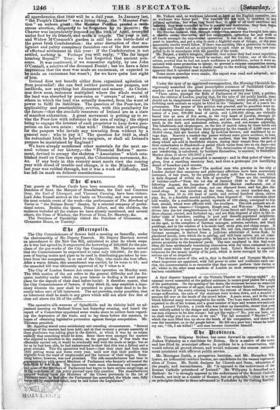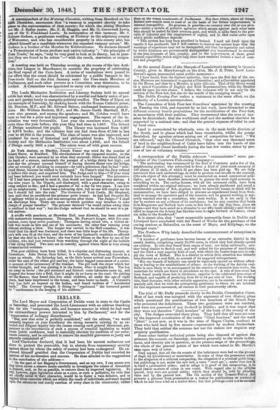'Jbe 41robintes.
Mr. Thomas Ridgway Bridson has come forward in opposition to Sir Joshua Walmsley as a candidate for Bolton. He is a native of the town, and has filled its municipal offices: in politics he is a Conservative, who would reform all proved abuses, and would welcome the utmost retrench- ment consistent with efficient public service.
Mr. Montague Smith, a prosperous barrister, and Mr. Humphry Wil- lyams, an influential resident banker, are candidates for the vacant represent- ation of Truro. Mr. Smith declares for Church and State, education of the people, and retrenchment. He " is opposed to the endowment of the Roman Catholic priesthood of Ireland." Mr. Willyams is described as Radical: he " is strongly opposed to the endowment of the Roman Catholic Church, not only as a matter of finance, but on principle,"—that is to say, on principles similar to those advocated in Yorkshire by Sir Culling EardleY. A correspondent of the Morning Chronicle, writing from Hereford on the 24th December, announces that "a vacancy is expected shortly to take place in the representation of that county; for which the sitting Members are Mr. J. Bailey junior, Mr. F. R. Haggitt, and Mr. G. Cornewall Lewis, son of Sir T. Frankton(' Lewis. In anticipation of this vacancy, Mr. S. Holmes Godson, a gentleman residing at Finbury in the adjoining county of Worcester, and who has considerable property in this county also, has offered himself as a candidate whenever the expected vacancy occurs." Mr. Godson is a brother of the Member for Kidderminster. He declares himself
a Protectionist of home produce and native industry ": " the principles of Free Trade," he says, "may be very good to look at in theory, but in prac- tice they are found to be rotten "—" with the result, starvation or emigra- tion."
A meeting was held on Thursday evening, at the rooms of the late Anti- Corn-law League in Manchester, to consider the propriety of celebrating the final repeal of the Corn-laws. A series of resolutions were passed to the effect that the event should be celebrated by a public banquet in the Free-trade Hall on the 31st January next: the Free-trade Members of Parliament, and such other persons as a Committee may determine, to be invited. A Committee was appointed to carry out the arrangements.
The Leeds Mechanics Institution and Literary Society held its annual soiree last week; and was characterized by a cordial and hearty union of per- sons and parties lately in energetic political conflict. The Dean of Ripon set the example of fraternity, by shaking hands with the Roman Catholic priest; Mr. Denison, M.P., and Mr. Edward Baines, exchanged humorous gratula- dons. Mr. William Beckett, M.P., and Mr. James Garth Marshall, M.P., were also present, and among the speakers; and Mr. Cobden would have been so but for a prior and important engagement. The report of the in- stitution was very favourable. Last year the members were, 1,416,-60 more than the year before; this year they had risen to 1,867. The School of Design numbered 106 pupils. The library was increased from 6,607 to 6,974 books; and the volumes lent out had risen from 47,349 in last year to 48,924 in the present. The class of issues was also improved, and consisted far more of historical and philosophical books. The Literary Society and the Mechanics Institution cost about 1,2501., and the School of Design nearly 5001. a year. The soirée went off with great success.
At York Assizes, on Monday, Joseph Foster was tried for the murder of Robert Slater, at Bradford. The circumstances of the supposed murder, on the 24th October, were narrated by us when they occurred: Slater was found dead on the bank of a stream, underneath the parapet of a bridge thirty feet high; and next day the prisoner accused himself of having thrown Slater over the bridge, after an evening of drinking in company—he told a policeman that he bad " mur- dered Slater, because he wished to be hanged." On Foster's trial the Jury refused to believe this story, and acquitted him. The Judge said to him—" If your story had been believed, you would most certainly have been hanged." The prisoner— "If I had been prepared to meet it, that would not have been so very serious. I was nine years in the Guards, and discharged, with a good character' owing to being subject to fits; and I bad a pension of 6d. a day for two years. I can now get no employment. I have been a labouring dyer, but no one will employ me for fear I should fall into the vats." The Governor of York Castle, Mr. Shepherd, here said that he considered the prisoner quite insane: he had had frequent fits of epilepsy whilst in gaol, and was outrageous after them. The Judge—" I shall not discharge him. There are cases in which parishes may interfere to take charge of pauper lunatics." The prisoner declared "he would rather swing than be confined in that way"; but the,Judge ordered that he should be sent to a pa risk asylum.
A scuffle with poachers, at Shawdon Hall, near Alnwiek, has been attended with melancholy consequences. Thompson, Mr. Pawson's keeper, with five com- panions, came upon seven poachers : Thompson having seized two, a violent at- tack was made on him and one of his assistants; the other four running away without striking a blow. The keeper was carried to the Hall senseless; it was found that his skull was fractured, and there was little hope of his life. Thomp- son's wife was ill at the time, and the news of her husband's condition so affected her that she died in a few hours: she was found lifeless on the floor by one of her children, who had just returned from watching through the night at the bedside of her dying father. Two men are in custody, against whom there is very strong circumstantial evidence.
Five poor children have been killed, in a singular and distressing manner, at Faversham. John Davey, their father, is a hawker, who lives and travels in a house on wheels. On Saturday last, as the little house arrived near Faversham, under the care of the eldest girl and boy, the latter begged some straw of a carter, on account of the inclemency of the weather. The girl took the straw which her brother brought, and was putting it in the house, when it caught fire. The boy ran away in terror the girl screamed and fainted: some labourers came up, and dragged the house into a field, that it might do no harm on the road. On putting out the flames, they found that five other children, all under the age of eight years, had been imprisoned in the house, and been burnt to death. A Coroner's Any has held an inquest on the bodies, and found verdicts of " Accidental death." The Coroner thought it fitting to "reprimand " the bereaved parent for "carelessness in the keeping of his children."



























 Previous page
Previous page